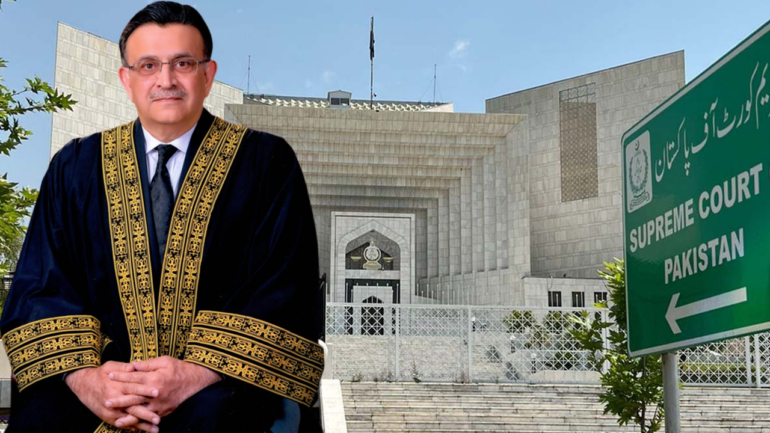The Supreme Court (SC) Friday declared the Supreme Court (Review of Judgments and Orders) Act 2023 “unconstitutional”.
The Act, which aimed to extend the scope of review petitions, was struck down by a three-member bench of the Supreme Court, led by Chief Justice Umar Ata Bandial.
The three member bench, which included Justice Munib Akhtar and Justice Ijazul Ahsan, reserved the decision on the case on June 19.
The law granted the right to appeal under Article 184(3) of the Constitution, which gives power to the apex court to issue order on the issues which pertains to questions of public importance including enforcement of fundamental rights.
The court’s detailed verdict deemed the Act “repugnant” to the Constitution and beyond the legislative competence of Parliament, resulting in its nullification.
The verdict highlighted that any ordinary legislation attempting to infringe upon the Supreme Court’s powers, including review jurisdiction, is an incorrect interpretation of the Constitution.
The judgement further emphasized that Parliament lacks the explicit authority to enlarge the Supreme Court’s review jurisdiction under Article 188. The Act was considered to create an unauthorized appellate jurisdiction that lacks a constitutional basis.
Justice Munib Akhtar, in an additional note, underscored that a review is distinct from an appeal, citing historical legal precedents.
He argued that the Act attempted to alter the nature of the court’s jurisdiction by transforming its review jurisdiction into an appellate one.
The ruling has sparked debates about its potential impact on cases involving the disqualification of former Prime Minister Nawaz Sharif.
Former law minister Azam Nazeer Tarar expressed the view that the verdict wouldn’t affect Nawaz Sharif’s cases, as amendments to the Elections Act had already addressed the matter.
The Act, passed in May 2023 amid disputes between the government and the judiciary, was intended to enhance the Supreme Court’s review powers. However, its provisions were seen by the opposition as an attempt to reverse Nawaz Sharif’s disqualification.
The Supreme Court’s verdict coincides with Prime Minister Shehbaz Sharif’s announcement of Nawaz Sharif’s return to Pakistan, though a specific date wasn’t provided. The ruling has raised questions about the balance between Parliament’s authority and the judiciary’s independence in shaping the legal landscape.



